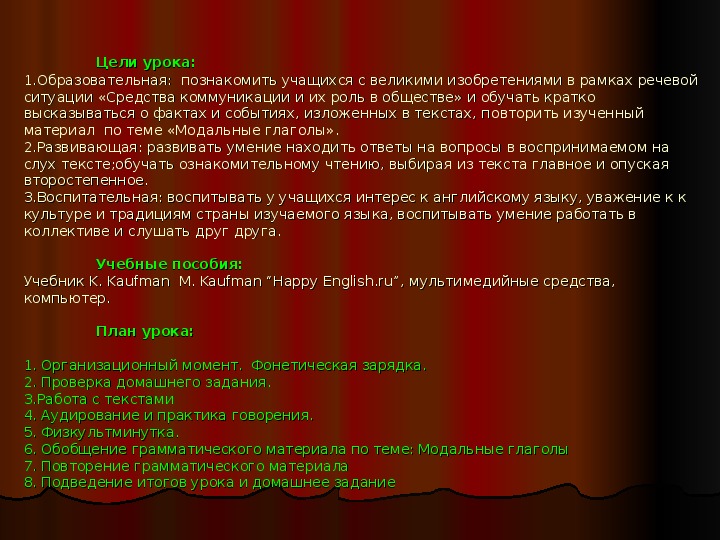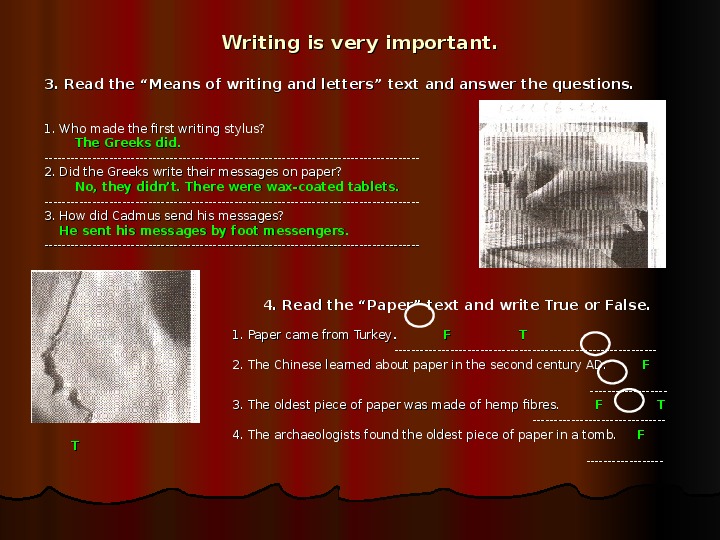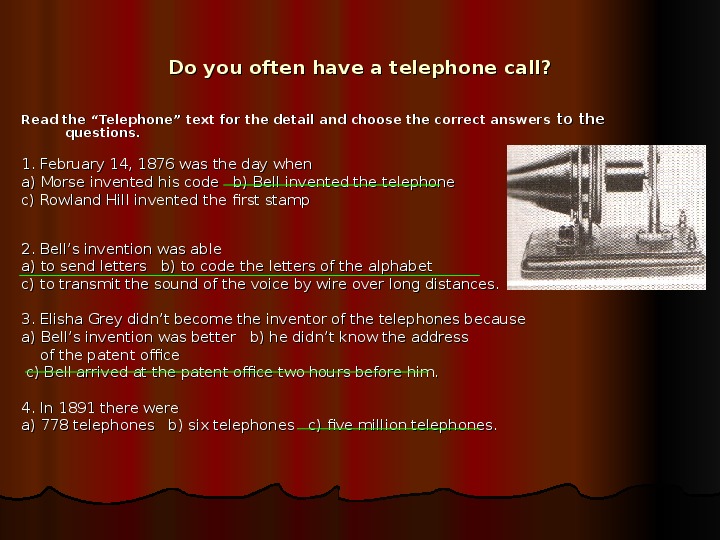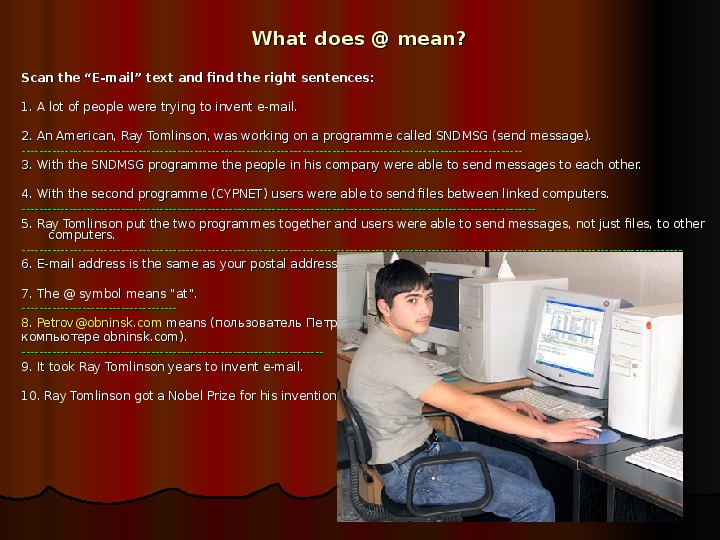Презентация к уроку в 7 классе "Средства массовой коммуникации". Эта презентация отражает все этапы урока, основные виды средств массовой коммуникации, раскрывает в полной мере их суть. в простой и игровой форме, а также в форме упражнение происходит усвоение нового изученного материала. Идет повторение модальных глаголов. Уделяется внимание устной и письменной речи. В конце презентации подводятся итоги урока.Презентация по теме: "Means of communication"(Средства коммуникации, 7 класс)
языка
языка
в 7 «Г» классе
в 7 «Г» классе
Means of communication
Means of communication
Урок английского
Урок английского
Modal verbs
Modal verbs
Учитель: Гусева Ксения
Учитель: Гусева Ксения
Валерьевна
Валерьевна
2017 год
2017 год

Цели урока:
Цели урока:
1.Образовательная: познакомить учащихся с великими изобретениями в рамках речевой
1.Образовательная: познакомить учащихся с великими изобретениями в рамках речевой
ситуации «Средства коммуникации и их роль в обществе» и обучать кратко
ситуации «Средства коммуникации и их роль в обществе» и обучать кратко
высказываться о фактах и событиях, изложенных в текстах, повторить изученный
высказываться о фактах и событиях, изложенных в текстах, п
материал по теме «Модальные глаголы».
2.Развивающая: развивать умение находить ответы на вопросы в воспринимаемом на
2.Развивающая: развивать умение находить ответы на вопросы в воспринимаемом на
слух тексте;обучать ознакомительному чтению, выбирая из текста главное и опуская
слух тексте;обучать ознакомительному чтению, выбирая из текста главное и опуская
второстепенное.
второстепенное.
3.Воспитательная: воспитывать у учащихся интерес к английскому языку, уважение к к
3.Воспитательная: воспитывать у учащихся интерес к английскому языку, уважение к к
культуре и традициям страны изучаемого языка, воспитывать умение работать в
культуре и традициям страны изучаемого языка, воспитывать умение работать в
коллективе и слушать друг друга.
коллективе и слушать друг друга.
Учебник K. Kaufman M. Kaufman “Happy English.ru”
Учебник
компьютер.
компьютер.
Учебные пособия:
Учебные пособия:
K. Kaufman M. Kaufman “Happy English.ru”, мультимедийные средства,
, мультимедийные средства,
План урока:
План урока:
1. Организационный момент. Фонетическая зарядка.
1. Организационный момент. Фонетическая зарядка.
2. Проверка домашнего задания.
2. Проверка домашнего задания.
3.Работа с текстами
3.Работа с текстами
4. Аудирование и практика говорения.
4. Аудирование и практика говорения.
5. Физкультминутка.
5. Физкультминутка.
6. Обобщение грамматического материала по теме: Модальные глаголы
6. Обобщение грамматического материала по теме: Модальные глаголы
7. Повторение грамматического материала
7. Повторение грамматического материала
8. Подведение итогов урока и домашнее задание
8. Подведение итогов урока и домашнее задание
1. Организационный момент. Рапорт дежурного.
1. Организационный момент. Рапорт дежурного.
Задания к уроку.
Задания к уроку.
2. Фонетическая зарядка по материалу
2. Фонетическая зарядка по материалу
домашнего задания.
домашнего задания.
the Chinese
the Chinese
Egypt
Egypt
the Egyptians
the Egyptians
waxwax
Cadmus
Cadmus
fibres
fibres
Roland Hill
Roland Hill
Samuel Morse
Samuel Morse
Graham Bell
Graham Bell
Elisha Gray
Elisha Gray
Ray Tomlinson
Ray Tomlinson
[CaI‘‘nJz]nJz]
[CaI
[‘[‘IdZIpt]
IdZIpt]
[[II‘‘dZIpSqnz]
dZIpSqnz]
[wxks]
[wxks]
[‘k[‘kxdmqs]
xdmqs]
faIbqz]
[[‘‘faIbqz]
[[‘‘roulqnd hIl]
roulqnd hIl]
[[‘‘sxmjuql mO:s]
sxmjuql mO:s]
[[‘‘grxm bel]
grxm bel]
[[‘‘IlISq greI]
IlISq greI]
[reI ‘‘tOmlInsqn]
tOmlInsqn]
[reI
3. Проверка домашнего задания -
3. Проверка домашнего задания -
Упр.7, с.74.
Упр.7, с.74.
1.Who invented paper?
a)
the Chinese b) the Japanese c) the English
2. Who invented the alphabet?
a)
the Jews b) the Greeks c) the Egyptians
3. Who invented ink?
a)
the Egyptians and the Chinese b) the Chinese c) the
Arabs
4.Who first sent private letters from one person to
another?
the Greeks b) the Egyptians c) the Romans
a)
5. Who invented the stamp?
a)
the English b) the Russians c) the Americans
6. Who invented the telephone?
a) Telephone b) Popov c) Alexander Graham Bell
7. Who invented the telegraph?
a) Alexander Graham Bell b) Samuel Morse c) Mary
Telegraph
8. Who invented the e-mail?
a) the Americans b) the Russians c) the Germans
3. Работа с текстами
3. Работа с текстами
1. Read the “Ink”
1. Read the “Ink”
text and answer the
text and answer the
questions.
questions.
1.People invented ink more than four thousand years ago, didn’t
they?
Yes, they did.
2.Did the Chinese and the Egyptians invent ink at the same time?
Yes, they did.
3.Where did the first man who used ink come from?
He came from China.

Writing is very important.
Writing is very important.
3. Read the “Means of writing and letters” text and answer the questions.
3. Read the “Means of writing and letters” text and answer the questions.
The Greeks did.did.
1. Who made the first writing stylus?
1. Who made the first writing stylus?
The Greeks
---------------------------------------------------------------------------------------
---------------------------------------------------------------------------------------
2. Did the Greeks write their messages on paper?
2. Did the Greeks write their messages on paper?
NoNo, , they didn’t. There were wax-coated tablets.
they didn’t. There were wax-coated tablets.
---------------------------------------------------------------------------------------
---------------------------------------------------------------------------------------
3. How did Cadmus send his messages?
3. How did Cadmus send his messages?
He sent his messages by foot messengers.
He sent his messages by foot messengers.
---------------------------------------------------------------------------------------
---------------------------------------------------------------------------------------
4. Read the “Paper” text and write True or False.
4. Read the “Paper” text and write True or False.
F
TT
1. Paper came from Turkey
-------------------------------------------------------------
-------------------------------------------------------------
2. The Chinese learned about paper in the second century AD.
------------------
------------------
3. The oldest piece of paper was made of hemp fibres. F F
TT
3. The oldest piece of paper was made of hemp fibres.
-------------------------------
-------------------------------
4. The archaeologists found the oldest piece of paper in a tomb. F F
4. The archaeologists found the oldest piece of paper in a tomb.
------------------
------------------
1. Paper came from Turkey.. F
2. The Chinese learned about paper in the second century AD.
F
F
T T
TT
55. Look through the “Telegraph” text and answer the questions:
. Look through the “Telegraph” text and answer the questions:
What does the word “telegraph” mean?
What does the word “telegraph” mean?
It means “to write far”
It means “to write far”
Does the telegraph transmit signals?
Does the telegraph transmit signals?
Yes, it does.
Yes, it does.
Who invented the electronic alphabet?
Who invented the electronic alphabet?
Samuel Morse did.
Samuel Morse did.
What was it possible to do with the help of Morse code?
What was it possible to do with the help of Morse code?
It was possible to code the letters
It was possible to code the letters
Which two cities did the first telegraph connect?
Which two cities did the first telegraph connect?
It connected Washington and
It connected Washington and
and signs of a language.
and signs of a language.
Baltimore.
Baltimore.

Do you often have a telephone call?
Do you often have a telephone call?
to the
Read the “Telephone” text for the detail and choose the correct answers to the
Read the “Telephone” text for the detail and choose the correct answers
questions.
questions.
1. February 14, 1876 was the day when
1. February 14, 1876 was the day when
a) Morse invented his code b) Bell invented the telephone
a) Morse invented his code b) Bell invented the telephone
c) Rowland Hill invented the first stamp
c) Rowland Hill invented the first stamp
2. Bell’s invention was able
2. Bell’s invention was able
a) to send letters b) to code the letters of the alphabet
a) to send letters b) to code the letters of the alphabet
c) to transmit the sound of the voice by wire over long distances.
c) to transmit the sound of the voice by wire over long distances.
3. Elisha Grey didn’t become the inventor of the telephones because
3. Elisha Grey didn’t become the inventor of the telephones because
a) Bell’s invention was better b) he didn’t know the address
a) Bell’s invention was better b) he didn’t know the address
of the patent office
of the patent office
c) Bell arrived at the patent office two hours before him.
c) Bell arrived at the patent office two hours before him.
4. In 1891 there were
4. In 1891 there were
a) 778 telephones b) six telephones c) five million telephones.
a) 778 telephones b) six telephones c) five million telephones.

What does @ mean?
What does @ mean?
computers.
computers.
Scan the “E-mail” text and find the right sentences:
Scan the “E-mail” text and find the right sentences:
11. . A lot of people were trying to invent e-mail.
A lot of people were trying to invent e-mail.
2. 2. An American, Ray Tomlinson, was working on a programme called SNDMSG (send message).
An American, Ray Tomlinson, was working on a programme called SNDMSG (send message).
-----------------------------------------------------------------------------------------------------------------------
-----
------------------------------------------------------------------------------------------------------------
3. 3. With the SNDMSG programme the people in his company were able to send messages to each other.
With the SNDMSG programme the people in his company were able to send messages to each other.
4. 4. With the second programme (CYPNET) users were able to send files between linked computers.
With the second programme (CYPNET) users were able to send files between linked computers.
--------------------------------------------------------------------------------------------------------------------------
----
----------------------------------------------------------------------------------------------------------------
5. 5. Ray Tomlinson put the two programmes together and users were able to send messages, not just files, to other
Ray Tomlinson put the two programmes together and users were able to send messages, not just files, to other
-----------------------------------------------------------------------------------------------------------------------------------------------------------
------------------------------------------
-------------------------------------------------------------------------------------------------------------
6. 6. E-mail address is the same as your postal address.
E-mail address is the same as your postal address.
7. 7. The @ symbol means “at”.
The @ symbol means “at”.
--------------------------------------------
----------------------------
8. 8. Petrov
Petrov@@obninsk
компьютере obninsk
компьютере
----------------------------------------------------------------------
----------------------------------------------------------------------
9. 9. It took Ray Tomlinson years to invent e-mail.
It took Ray Tomlinson years to invent e-mail.
10. 10. Ray Tomlinson got a Nobel Prize for his invention.
Ray Tomlinson got a Nobel Prize for his invention.
means (пользователь Петров на
(пользователь Петров на
obninsk..comcom means
obninsk..comcom).).
Практика аудирования.
Практика аудирования.
Упражнение 3 стр. 73.
Упражнение 3 стр. 73. Listen to the text and answer:
Listen to the text and answer:
1. Can flowers be a means of communication?
1. Can flowers be a means of communication?
2. What does the yellow lily mean?
2. What does the yellow lily mean?
3. What does the yellow carnation mean?
3. What does the yellow carnation mean?
happiness “
“ “ happiness “
““ nono “ “
Физкультминутка
Физкультминутка
Hands up! Hands down!
Hands up! Hands down!
((поднимают и опускают руки)
поднимают и опускают руки)
Hands on hips! Sit down!
Hands on hips! Sit down!
((руки на пояс, садятся)
руки на пояс, садятся)
Hands up! To the sides!
Hands up! To the sides!
((руки наверх, в стороны)
руки наверх, в стороны)
Bend left! Bend right!
Bend left! Bend right!
((наклоняются влево, вправо)
наклоняются влево, вправо)
One, two, three... Hop!
One, two, three... Hop!
((прыгают)
прыгают)
One, two, three... Stop!
One, two, three... Stop!
((останавливаются).
останавливаются).
Stand still!
Stand still!
((успокаиваются)
успокаиваются)
11..Which of these things can you call a means of communication?
Which of these things can you call a means of communication?
2. How can you use them to communicate?
2. How can you use them to communicate?
3. Which of these means of communication do you take for granted?
3. Which of these means of communication do you take for granted?
Работа с учебником.
Работа с учебником.
Упр. 4
стр. 73 Listen, follow the text and mark the answer:
4 стр.
73 Listen, follow the text and mark the answer:
Упр.
1. What did people do when they didn't have the
1. What did people do when they didn't have the
alphabet?
alphabet?
2. What did people do when they didn’t have post offices?
2. What did people do when they didn’t have post offices?
3. What did people do when they didn’t have the
3. What did people do when they didn’t have the
telephone and
telephone and
the telegraph?
the telegraph?
4. 4. A physical training minute:
A physical training minute:
Are you tired? Let’s do exercises.
Hands up! Hands down!
Hands on hips! Sit down!
Stand up! Hands to the sides!
Turn left, turn right!Hands on hips!
5. 5. Повторение грамматического материала.
Если мы хотим рассказать о том, что умеем делать, то употребляем
модальный глагол….
Если нужно спросить о разрешении чтото выполнить, то мы
используем глагол…
Модальный глагол must употребляется, когда нужно сказать о….
Форма модальных глаголов для всех лиц и чисел…
После модальных глаголов основной глагол употребляется….
В отрицательных предложениях частица not …
Чтобы задать вопрос к предложению с модальным глаголом ,
нужно…
Выполнение грамматического упражнения по теме: «Модальные
Используя лексику, постройте правильные предложения
глаголы».
1. can / you / help / I ?
2. English / read / must / books / we / .
3. come / may / I / in / ?
4. you / speak / English / can / ?
5. may / I / open / the / window/ .
6. I ? learn / must / this / poem / ?
Повторение модальных глаголов
Повторение модальных глаголов
Say what we must or mustn’t do to be healthy and fit::
Say what we must or mustn’t do to be healthy and fit
to eat sweets and cakes
to eat fruit, to clean teeth
to wash hands, to swim
to go for a walk
to smoke
to play computer games
to clean rooms
to watch TV
Повторение модальных глаголов.
Повторение модальных глаголов.
Вставитьть модальные глаголы can, may , must.
модальные глаголы can, may , must.
Встави
1. In this room we …. see a sofa and two arm-
1. In this room we …. see a sofa and two arm-
chairs.
chairs.
2. Children… not play in the street.
2. Children… not play in the street.
3. We…read the text. It is our homework..
3. We…read the text. It is our homework..
4. … I play in the garden or in the yard?
4. … I play in the garden or in the yard?
5. …you speak, read and write English?
5. …you speak, read and write English?
6. … we go home?
6. … we go home?
7. Подведение итогов урока.
7. Подведение итогов урока.
Отзывы учащихся об уроке. .
Отзывы учащихся об уроке
How did you like this lesson?
How did you like this lesson?
The lesson was very interesting.
The lesson was very interesting.
I knew many new things.
I knew many new things.
I remembered many new phrases.
I remembered many new phrases.
It will be useful for me.
It will be useful for me.
There was something at the lesson to think
There was something at the lesson to think
I’ve got answers to all the questions.
I’ve got answers to all the questions.
I ‘d put the (mark) to myself.
I ‘d put the (mark) to myself.
about.
about.
Оценки учащихся.
Оценки учащихся.
Домашнее задание: Quiz Quiz упр. 7 стр. 74
упр. 7 стр. 74
Домашнее задание:
Теория стр. 71-72 и упр. 1 стр. 72
Теория стр. 71-72 и упр. 1 стр. 72
Yes / No
